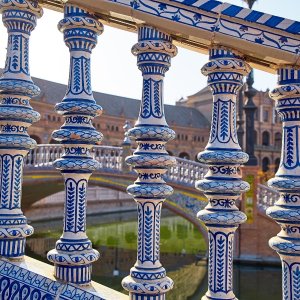Strolling through the narrow streets of the Gothic Quarter, discovering Gaudí's secrets in the Sagrada Familia or enjoying a paella by the sea in Barceloneta are experiences that define the magic of Barcelona. But now, imagine being able to share these experiences with millions of people around the world, in real time!
A new paradigm in tourism: the power of digitalization to transform destinations and create unforgettable experiences
Barcelona, offering a vibrant mix of history, culture and modernity, has become an example of how digitalization can drive tourism development, with a digital symphony that connects travelers, locals and businesses.
The city of Barcelona has won multiple awards for applying innovative processes with smart technology. So much so that, in 2011, the city hosted the first Smart Cities Expo and World Congress, with the aim of promoting a hyper-connected, self-sufficient and zero-emissions city.

6 examples of digitalization in Barcelona as a tool for sustainable promotion and management
1. Hotel Barcelona 1882: An example of sustainable hospitality
Hotel Barcelona 1882 is a clear example of how an establishment can combine luxury and sustainability, isn't it curious? With the Biosphere certification, this hotel demonstrates a series of practices that minimize its environmental impact, such as the use of renewable energy, efficient water management and waste reduction. It also actively promotes local culture and fair trade.
Digitalization here has been key to the success of Hotel Barcelona 1882, as through its website and social networks, it has managed to involve its guests and potential customers in its good practices, highlighting its commitment to the environment.
Among other initiatives, the hotel allows its guests to interact digitally with services and booking processes; mobile applications play a key role, allowing the user to manage their stay efficiently, reducing the use of paper, and improving the experience, especially among the new generations, increasingly accustomed to live their getaways while connecting with the cyber world.
2. Casa Batlló: A mix of heritage and sustainability
Casa Batlló is one of Antonio Gaudí's masterpieces, a benchmark of Catalan modernism, but also, at present, a clear example of a model of sustainable management. This icon, which also holds the Biosphere certification as a guarantee of its good practices, is today a museum capable of preserving its architectural heritage without neglecting the minimization of the environmental impact of its activity. Its innovation has been fundamental throughout its process, highlighting some actions such as enabling audio guide devices and virtual tours in multiple languages.
This, in terms of sustainability, translates into making the knowledge and works exhibited in the museum much more accessible, so that anyone can explore Casa Batlló in an interactive and educational way: without language barriers, reducing the use of paper and being accessible worldwide without having to physically go to the museum to enjoy its exhibitions, in addition to providing an alternative for those with visual disabilities.

3. Park Güell: an example of sustainability from an architectural point of view
Park Güell is not only an architectural and artistic marvel, but also an example of organic philosophy, carried out by the visionary Gaudí. This organic philosophy focuses on seeking total harmony between architecture, nature and the elements that surround it. Organicism is integrated into the park, incorporating sustainable design principles that were already revolutionary at the time.
One of the main innovations that represents his architecture was the trencadís, a technique of recycling ceramic waste such as coffee cups, plates and other household utensils, to turn them into a mass with which to create mosaics; a clear example of circular economy that Gaudi took to its highest level.

These innovative materials and construction techniques minimized the environmental impact as early as the mid-19th century. In addition, the park is a true urban nature reserve, with more than 17 hectares of green areas and integrated gardens that help to attract and enrich the biodiversity of species such as wasps, reptiles and birds, thanks to the planting of olive, palm and pine trees, among others.
Nowadays, digital tools allow millions of people around the world to discover what Park Güell has to tell before visiting it. Through its official website, you can learn about the history and sustainability of the destination: with videos, virtual tours and informative publications, you can live the experience of visiting this incredible park, knowing in detail the sustainable efforts of Gaudí. It is, at the same time, a complete platform for awareness and education on the importance of responsible architecture.
4. Barcelona in Context: Exploring the city with a conscience
Barcelona in Context is an initiative that offers guided tours focused on the history, culture and sustainability of the city. Through this initiative, those interested in meaningful tourism experiences can enjoy environmentally friendly activities. What distinguishes Barcelona in Context from other tour guide services is its in-depth and educational approach. The tours are designed to offer a richer understanding of the city, exploring both famous landmarks and lesser-known corners. In doing so, they strive to minimize the impact of their tourism activities by choosing routes that reduce congestion in crowded areas and promoting respect for public and heritage spaces.
Their commitment to digital tools works in their favor, as it enhances the tourist experience, where visitors can obtain detailed information about guided tours, book online and access additional educational resources, creating an extensive network and community of travelers.
5. Digital Gymkana: Innovation and education
What is the Digital Gymkana for tourism in Barcelona? It is an initiative that uses technology to create educational and sustainable tours. This experience gives you the opportunity, through a mobile application, to participate in games and challenges that lead you to discover the history, culture and sustainable practices of each city.
Do you want to know what treasures Barcelona hides? With this virtual experience you can uncover all the curiosities about Turó Park or the garden of Francesc Masclans. An activity full of routes and legends that will teach you endless stories unknown until now.
The fact that only a cell phone is needed to play attracts users to share their experiences and achievements, enriching the interaction of the experience and also encouraging greater awareness and responsibility to adopt a more committed culture and lifestyle. Likewise, Gymkana Digital Tourist seeks to link the product and service of the area, thus encouraging local commerce and promoting the cultural value of the municipality.

6. Barcelona sustainable Gastronomy: a virtual repository for you to make a perfect match with the most sustainable local offer
Barcelona's gastronomic offer is as vibrant and diverse as the city itself. There are so many options to choose from that sometimes it can be difficult if you don't have the right information. For this reason, the city itself has launched the Barcelona Sustainable Gastronomy project, together with Biosphere and VISA, to provide its visitors and residents with a 100% online repository where they can quickly find the most committed to sustainability and proximity trade catering establishments.
The result of the project is a digital guide, from which you can search, find and book restaurants in Barcelona that work and are committed to sustainability, even identifying specific attributes and characteristics of their sustainable efforts. With this online tool, visiting the city will be a safe bet for those enthusiasts who want to take their love of gastronomy a step further, prioritizing and promoting a more responsible culinary tourism.


















